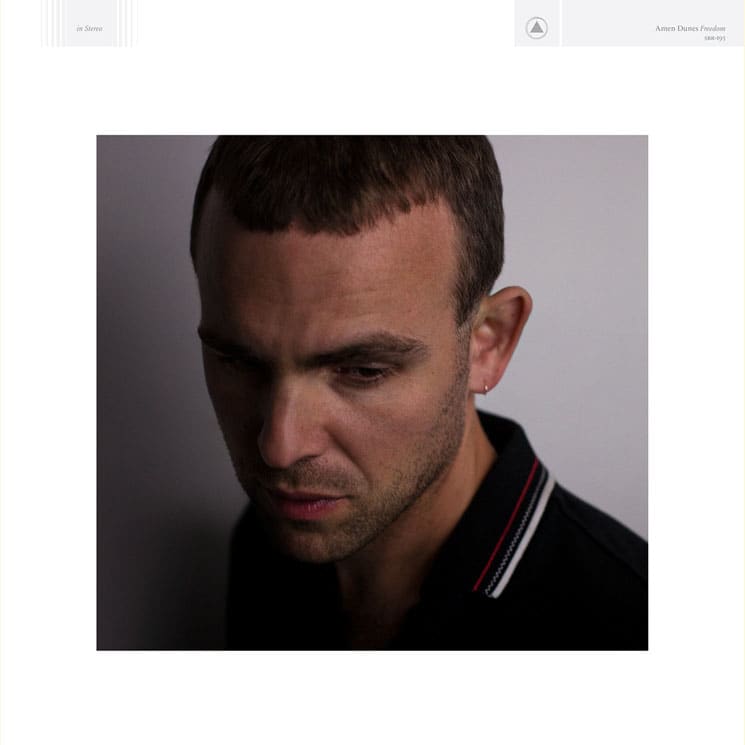In his ten years as Amen Dunes, Damon McMahon's music has never shied away from introspection. Freedom is the New York-based songwriter's fifth album, which overcame several obstacles throughout its creation. From scrapped recording sessions to his mother being diagnosed with terminal cancer, unresolved hardship and trauma often guide the spiritual rollercoaster penned throughout McMahon's most deeply personal work to date.
With a powerful list of collaborators — including Beach House producer Chris Coady, guitarist Nick Zinner and Delicate Steve, among others — Amen Dunes refine their eerie psych-pop gaze with sprawling atmospheric production and crystalline guitar riffs sweeping through the most polished tracks he's ever created.
The album opens with "Blue Rose," a swirling pop gem with sharp percussion and silvery chords orbiting around McMahon's vocals. Speaking on his past with an absent father, his perseverance and hunger for self-improvement push through the grief, even when lyrics like "Said you weren't much a man to me / But you're the only one I've ever had" reveal just how conflicting his feelings truly are. "Calling Paul the Suffering" continues this narrative with gleaming synthesizer hums and muffled guitars that brighten things up a bit. The album's standout track, "Mika Dora," is a beautiful exercise in release and deconstructing the problematic myths imbued in masculinity. With hi-hat slithers and subtle twangs washing over warm, swelling reverb, McMahon centres Dora, a lifelong criminal and prolific surfer known for his blind heroics as a character used to facilitate a space to debunk the illusions that have informed his own manhood throughout the years.
Affirmations like this come all too often on Freedom. With a cast of characters birthed in either fictional or untold narratives, each song reads like old scriptures invigorated with elements of '80s rock and pop sensibilities, written and produced with the impact of every story top-of-mind. Midway through the album, on "Believe," McMahon's emotional ode to his mother finds him bellowing over a bluesy-folk backdrop, as agony resides at the tip of his gritty vibrato.
Freedom's expansive journey ends at the 48-minute mark after "L.A" closes things out, but it marks a significant turn in McMahon's artistry. The enigmatic beginnings of Amen Dunes have taken him from self-isolated drone-folk to more vulnerable, genre-splicing rock music that's helping him discover more about himself as a person and as a musician. At the start of the album a young boy shouts "This is your time / Their time is done / It's over" and reminds McMahon of this again at the end of the album. If songwriter can take heed to this message, there's no telling where Amen Dunes' devotional sounds will take him next.
(Sacred Bones)With a powerful list of collaborators — including Beach House producer Chris Coady, guitarist Nick Zinner and Delicate Steve, among others — Amen Dunes refine their eerie psych-pop gaze with sprawling atmospheric production and crystalline guitar riffs sweeping through the most polished tracks he's ever created.
The album opens with "Blue Rose," a swirling pop gem with sharp percussion and silvery chords orbiting around McMahon's vocals. Speaking on his past with an absent father, his perseverance and hunger for self-improvement push through the grief, even when lyrics like "Said you weren't much a man to me / But you're the only one I've ever had" reveal just how conflicting his feelings truly are. "Calling Paul the Suffering" continues this narrative with gleaming synthesizer hums and muffled guitars that brighten things up a bit. The album's standout track, "Mika Dora," is a beautiful exercise in release and deconstructing the problematic myths imbued in masculinity. With hi-hat slithers and subtle twangs washing over warm, swelling reverb, McMahon centres Dora, a lifelong criminal and prolific surfer known for his blind heroics as a character used to facilitate a space to debunk the illusions that have informed his own manhood throughout the years.
Affirmations like this come all too often on Freedom. With a cast of characters birthed in either fictional or untold narratives, each song reads like old scriptures invigorated with elements of '80s rock and pop sensibilities, written and produced with the impact of every story top-of-mind. Midway through the album, on "Believe," McMahon's emotional ode to his mother finds him bellowing over a bluesy-folk backdrop, as agony resides at the tip of his gritty vibrato.
Freedom's expansive journey ends at the 48-minute mark after "L.A" closes things out, but it marks a significant turn in McMahon's artistry. The enigmatic beginnings of Amen Dunes have taken him from self-isolated drone-folk to more vulnerable, genre-splicing rock music that's helping him discover more about himself as a person and as a musician. At the start of the album a young boy shouts "This is your time / Their time is done / It's over" and reminds McMahon of this again at the end of the album. If songwriter can take heed to this message, there's no telling where Amen Dunes' devotional sounds will take him next.




